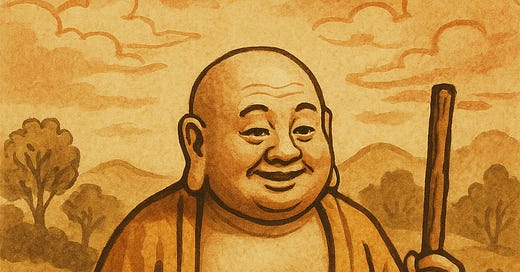TL;DR: This isn’t about religion. It’s about recognizing the sacred in the ordinary and resisting the narcissism of performative virtue. True Buddha nature doesn’t shout. It mops. It drives a night bus. It holds your hand in hospice. This is a meditation on invisible holiness, how real grace works undercover, and why those shouting the loudest about justice are often least willing to serve.
The first thing you learn when you’re cleared to carry a concealed weapon is this: you don’t talk about it. You don’t show it. You don’t posture. The permit isn’t a personality—it’s a pledge. You are not deputized to be loud. You are sworn to be invisible until the moment it absolutely matters.
That was the deal I made with the Arlington Chief of Police. I carried every day: a Kel-Tec P-32, a Glock 19, a Seecamp LWS32, sometimes a Kahr CM9. Inside the waistband, beneath the shirt, beneath the notice. I never printed. I never brandished. I carried with the quiet weight of responsibility, not bravado. And in five years, I never once drew my weapon. That’s the point.
I bring this up because I’ve come to believe Buddha nature is a kind of spiritual concealed carry.
You don’t brandish it. You don’t need to. The moment you flash it—whether it’s your enlightenment, your wokeness, your inner peace—you’ve already failed the test. The miracle doesn’t glow; it hums. The sacred doesn’t shout; it sits.
The real Buddhas? They mop floors at midnight in empty schools. They rock the dying in nursing homes. They teach first grade with love so deep it rewires your brain for life. (Thank you, Mrs. Kai. Thank you, Mrs. Sakai.) They don’t lead with hashtags or self-congratulatory bios. They just carry their light where it’s needed—without ever needing you to see it.
There’s a reason the old Zen saying goes: “If you meet the Buddha on the road, kill him.”
Because the real Buddha never announces himself.
I’ve had moments—maybe you have too. On a mountainside in Nepal with yaks and mist and quiet that vibrated deeper than any chant. On a river island in D.C. with two friends and a setting sun, and for a second, I was awake—enlightened, maybe. And then it was gone. Poof. Like the International Herald Tribune disappearing from my back pocket before a monk even asked. (He knew. He just knew.) Moments like that don’t last. They’re not supposed to.
They’re not for leverage. They’re for living.
And yet somehow, in modern America, we’ve built an entire culture of brandishing—spiritual, political, moral. People treating their awakening like a press badge. People turning their insight into influence. “Influencer” used to mean someone who sold protein powder. Now it’s people selling righteousness. Loudly.
Everyone wants to be the vanguard. No one wants to do the dishes.
We’ve replaced doing good with being seen doing good. We’ve mistaken speaking for acting. We outsource compassion to the state and call it solidarity. We support the undocumented because they clean our homes, but do nothing to stop the systems that keep them hiding in fear. We donate to justice like it’s a subscription service. Meanwhile, the real work—the mop, the prayer, the vigil, the quiet kindness—gets passed over for the next viral declaration.
I’m not here to brag. I’m not even here to confess. I’m here to say that the Buddha is probably folding laundry right now in a halfway house, and you’d never know.
And maybe that’s how it’s supposed to be.
Because if you truly carry Buddha nature, you don’t draw it until it’s needed. And even then, you don’t call it a miracle. You just call it showing up.
Cut wood. Carry water.
Shut up. Serve soup.
Conceal. Don’t brandish.
Do the thing. Leave the rest.
That’s what enlightenment looks like, if it looks like anything at all.
Appendix: The Laughing Buddha Doesn’t Need Your Like
You can call this section your digital prayer beads. Or your water cooler koan. Either way, it’s here to ground the idea that holiness doesn’t wear a name tag.
1. "If you meet the Buddha on the road, kill him" This infamous Zen koan doesn’t advocate violence. It warns against mistaking the finger for the moon. The moment someone claims enlightenment, sells it on a tote bag, or includes it in their speaker bio, it isn’t enlightenment anymore. True Buddha nature is allergic to branding.
2. Cut Wood, Carry Water Before enlightenment, chop wood, carry water. After enlightenment, chop wood, carry water.
Translation: even after awakening, your job is still the dishes. Realized beings don’t get promoted to Management. If anything, they go deeper into service. The difference is, they don’t complain.
3. The Concealed Carry of Grace The author promised the Chief of Police in Arlington he would never brandish his concealed weapon. The same applies to spiritual power. If you ever see someone waving their Buddha credentials, it’s cosplay. Real strength stays holstered.
4. Miracles Should Be Invisible In Taoist lore and Buddhist tradition alike, it’s bad form to show off your powers. Levitate if you must, but make it look like sitting. Cross the lake, but do it while feeding the ducks. The miracle isn’t spectacle — it’s discretion.
5. There Are Buddhas Everywhere Mrs. Sakai in Hawaii. The janitor mopping a hallway at 2 a.m. Your hospice nurse. That guy who didn’t take credit. That woman who never interrupted. None of them had podcasts. All of them carried Buddha nature like a folded note in a back pocket.
6. The Laughing Buddha Not Gautama. Not Siddhartha. The fat, giggling one in diners and nail salons. He’s not laughing at you. He’s laughing with you. Because the joke is: you keep looking for transcendence in people wearing robes, when it’s been coming from the lunch lady the whole time.
7. Final Koan Q: What is the sound of one influencer not posting? A: Enlightenment.
8. Cut Wood, Carry Content You want to be holy? Start by making someone’s life easier. Then do it again. Don’t talk about it. Don’t tweet about it. Don’t form a nonprofit. Don’t do a collab. Just help. Then help again. Then disappear.
Because real Buddhas don’t brandish. They serve. They smile. Then they vanish into the crowd.
The provided text, "Buddhas Never Brandish: On concealed carry, karmic humility, and the janitors of the sacred," argues that true spiritual enlightenment or "Buddha nature" is characterized by invisible, humble service rather than public display or self-promotion. The author draws a parallel between carrying a concealed weapon—requiring discretion and responsibility—and embodying genuine grace or virtue, suggesting that authentic goodness operates quietly and is not announced. The piece criticizes modern culture's tendency towards performative virtue and "brandishing" one's spiritual or moral insights, contrasting it with the quiet, often mundane acts of service performed by truly enlightened individuals. Ultimately, it emphasizes that real "miracles" and "Buddhas" are found in unassuming actions and ordinary people, who serve without seeking recognition or influence. The text concludes by asserting that enlightenment is about doing the work—cutting wood, carrying water, and serving soup—without fanfare.















Share this post